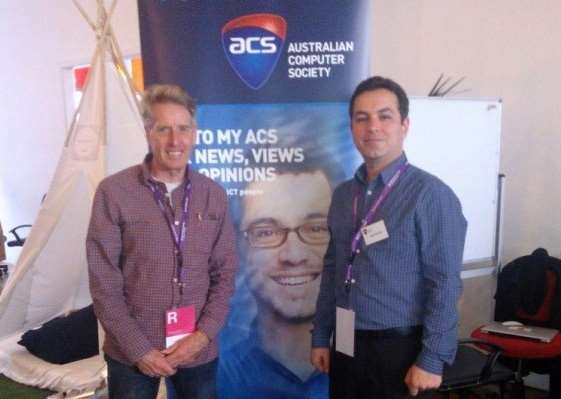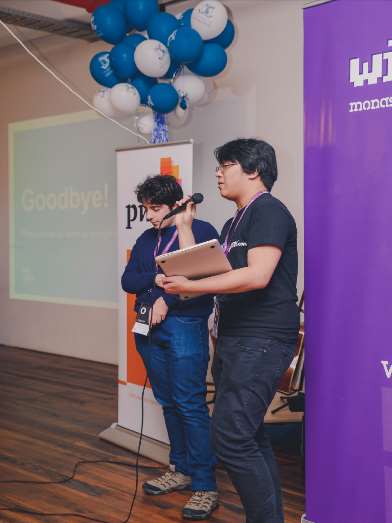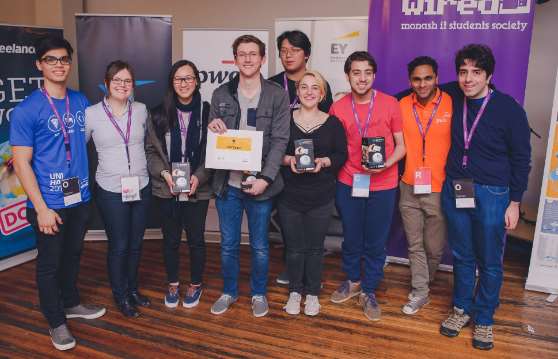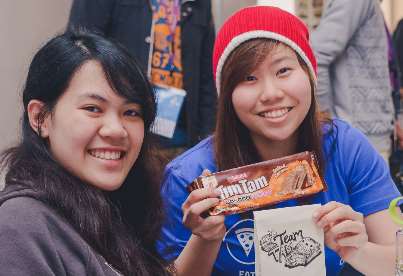Over a weekend in late August, approximately 90 students from all over Australia competed in teams at the UNIHACK 2015 hackathon for cash and other exciting prizes.
UNIHACK is a hackathon competition run for university students, by university students.
UNIHACK was created by Terence Huynh and Matthew Rossi in 2014. It is being organised with the help of WIRED Monash, the IT student society at Monash University Clayton.
The UNIHACK Organising Committee is a sub-committee within the WIRED Monash Executive that had full responsibility with the how the event was run, organising corporate sponsorship and promoting the event.
Other members of the Organising Committee were Martin Dulics – President, WIRED Monash, Esther Lim – former UNIHACK Competitor, and Jake Krelle – MSA Activities Officer.
This year UNIHACK was held at the Melbourne Inspire9 co-working space in Richmond. It was the second year that UNIHACK has been run, but its ongoing success means that it will be back bigger and better in 2016.
What happened this year?
The Slogan on the collateral and T Shirts was ‘Eat Sleep Code’, which certainly provided the insight to what the event was all about.
The UNIHACK website advertised that, ‘Teams have 24 hours to design and build something awesome. It can be anything - a website, a mobile application, a video game, or even something hardware. The important thing is that it needs to work when it is presented to the judges’.
After registration and the pre-event briefings for competitors, mentors and sponsors the UNIHACK teams set about their tasks.
Food was delivered at mealtimes and the competitors sweated, ate, drank, worked and some even managed to sleep for 24 hours.
Despite the UNIHACK fun aspect the judging criteria was strict and assessed the team creations on:
Originality - Is the hack more than just another generic social/mobile/local app? Does it do something entirely novel, or at least take a fresh approach to an old problem?
Technical Difficulty - Is the hack technically interesting or difficult? Is it just some lipstick on an API, or were there any technical challenges to surmount when building it?
Polish and Design - Is the hack usable in its current state? Is the user experience smooth? Does it work as the creators say? Is it well designed?
Usefulness - Is the hack practical? Is it something people would actually use? Does it fulfil a real need? Does it fulfil a real need people have?
Co-creators Mathew Rossi and Terence Huynh brief competitors (Photo: Tom Solari)
Expert judges joined the teams on Sunday afternoon to assess to creations and award the prizes.
Terence Huynh, Co-creator and co-organiser of UNIHACK 2015 said, “This year the students did not disappoint. We saw a wide variety of ideas such as finding the best fuel prices, self-destructing documents, photo collage makers, codebreakers and even a real-time collaboration system.
“The judges found it very hard to decide the winner”.
Come 2.00 pm Sunday the competition closed and the judging began; but was the pressure off? No.
To ensure fairness and obviously so the judges were able to manage their time, the competing teams had a short time to explain and present their solution while watching the allotted time tick away on the conspicuously positioned iPhone timer! Another real world skill learned on the way to the $3000 prize for the winner.
Overall the event was a great win for all participants however, the prize winners were:
| Prize Winner (Sponsor) | University | |
| First Place: | Destroy My Idea | RMIT |
| Second Place: | Fite Me | RMIT/Swinburne |
| Third Place: | Flyte | Monash |
| Best Design: | Fite Me | RMIT/Swinburne |
| Most Creative Idea: | Codebreaker | Monash |
| Best First Year Hack: | ShipIt/ThisApp | Monash |
| People’s Choice Award (Freelancer): | Delivar | Monash/UniMelb |
| Least Hacky Hack (CBA): | ChefUp | Monash |
| Making Things Happen Award (IMC): | Codebreaker | Monash |
| Best Mobile Hack (Outware): | Fridgebook | Swinburne/UNSW |
| Best Use of Braintree API (Braintree) | Delivar | Monash/UniMelb |
The first place prize for ‘Destroy my Idea’ was $3000 in cash, a Sphero 2.0 for each member and Seats at PwC's Technology Academy. ‘Destroy my Idea’ was produced by Paul Davidson, Joey Lee, Alex Robinson and Rebecca Trapani.
The Prize Winners (Photo Tom Solari)
The runners up received $1,000 and third place received $500 in cash.
Other sponsor prizes included: Parrot AR Drone, Arduino Kits, Apple Watches, Raspberry Pi’s, mentoring sessions, Adobe Creative Cloud subscriptions and various cash prizes, dinner and gift vouchers.
The Wrap Up
The success of this event is a great testament and boost for the in ICT profession as the UNIHACK event is growing year on year with a dramatic increase in participation from both many universities.
There was a 21 percent female participation which is something to work on for next year.
This level of participation is consistent with the latest ABS statistics finding that women made up 20 percent of all those studying ICT at university.
ACS is also committed to increasing the participation of women in the Australian ICT workforce.
As part of the commitment to increasing female and minority participation this year the organisers, Terence and Matthew:
- Engaged with groups representing women and LGBT IT students across Australia
- Increased the representation of female judges to three of seven
- Welcomed Paula Ngov from DiUS to deliver our first Diversity in ICT presentation during UNIHACK, which sought to encourage participants to act as agents of change in the companies that they will join in the future.
Carine Lim, Sarah Tan of Tick Doc (TeamTam) -(Photo: Tom Solari)
“This year has seen a marked increase in our collaboration with community organisations that has led to the growth of the participation of female students in UNIHACK,” Rossi said.
“I am very proud of being part of initiatives that seek to foster the engagement of traditionally underrepresented groups in ICT”.
Why ACS is involved
ACS Education Relations Victoria is proud to be involved as a key sponsor of UNIHACK.
The ACS was represented by Paul Carney, Victorian Branch Relationship Manager and Rod Dilnutt, Chair of the ACS Victoria Education Relations Committee.
Most importantly, Omid Aria an ACS Student Ambassador was there to help present and discuss the importance of the ACS as the peak body representing the ICT profession.
Speaking to Information Age, Dilnutt said ACS’ involvement was aimed at encouraging students to further develop ICT and STEM skills as well as to demonstrate the value that being a member of the ACS could provide.
“Over the years we’ve tended to see ACS members as professionals who are already working, and we only tend to get involved with students in the last year of their studies when they start to look for work,” Dilnutt said.
“We have student membership arrangements in place for students who want to take up that proposition, which is great.
“However it ignores other parts of the student population.”
Dilnutt said while the ACS could help students looking to take their first steps into the ICT profession, it could also assist with mentoring and coaching opportunities as well as facilitating access to industry.
The ACS is also working with universities to engage with academics and invite them to also join the ICT profession.
The ACS wishes all the participants and the winners of UNIHACK 2015 a bright future in the most important industry in our continually developing economy and we are sure we will see more of these extremely talented people in the years to come.
ACS looks forward to welcoming them all into the ICT profession on graduation.
Dr Rod Dilnutt FACS CP is Chair of the ACS Education Relations Committee, Victoria and Director of the ACS Membership Life Cycle Board. Paul Carney is Business Relationship Manager at ACS Victoria.












